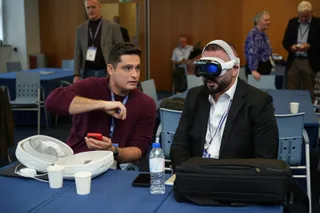Testing times; Universities pilot AR medical assessments
Contact Our Team
For more information about how Halldale can add value to your marketing and promotional campaigns or to discuss event exhibitor and sponsorship opportunities, contact our team to find out more
The Americas -
holly.foster@halldale.com
Rest of World -
jeremy@halldale.com

Students at Imperial College London and Leiden University are exploring whether they can replace the traditional exam paper with AR medical assessments.
The two institutions have conducted a pilot involving medical students using headset AR technology having successfully trialled it on a panel of experts.
"Introducing this technology means we can test students' ability to spatially orientate themselves when interacting with a digital version of the human anatomy," said Dr Amir Sam of Imperial's Department of Medicine.
"It really elevates the quality of our assessment and encourages far deeper understanding than simply looking at anatomy on paper."
Dr Sam said it was needlessly disjointed that students were exposed to the potential of AR as undergraduates only to face a traditional exam paper when they reach the end of their studies.
He said the two bodies had reviewed the training frameworks of other organisations before devising its AR medical assessments.
"I've seen no one else try to do what we are doing. It really does seem to be a first," Dr Sam said.
"AR has the potential to replicate some of these scarce resources in a much more sustainable way. With this technology, anatomists will reduce the need to use cadavers and centuries-old dissections in the teaching and assessment of human anatomy."


